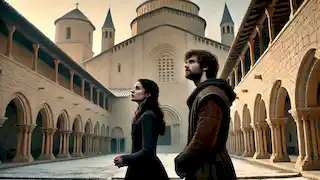The story of *By the River Piedra I Sat Down and Wept* follows Pilar, a woman who is reunited with a childhood love after many years of separation. Together, they embark on a journey of spiritual discovery and self-realization, interwoven with the themes of love, faith, and destiny.
Pilar is a young woman who has lost touch with the emotional side of life, preferring instead to focus on her studies and career. Her life seems to be moving forward, but there is an underlying emptiness that she cannot explain. Her reunion with her childhood love shakes her world and brings forth a spiritual quest that challenges her understanding of life and love.
The story is set in a small village in the French Pyrenees, where the cold, snow-covered landscape mirrors the emotional distance between the two protagonists. As they travel together, they are drawn to a deep spiritual bond that transcends the physical world. Along the way, Pilar and her lover confront their past, their beliefs, and their visions of the future.
As the journey begins, Pilar reflects on the choices she has made in life and the emotions she has repressed for so long.
"It is not life that matters, but the journey that lies ahead. I had spent so many years building walls around myself, walls that protected me from pain but also kept me from love. My world was safe, predictable, and devoid of the risks that love demands."
Her companion, whose name remains unknown throughout the story, has taken a different path in life. He has embraced a spiritual calling, and his faith has guided him through life's challenges. He speaks of miracles, divine intervention, and the power of prayer, all things Pilar struggles to understand. Nevertheless, she is drawn to him and the possibility of rediscovering the passion she once felt.
They travel through snowy villages, discussing philosophy and spirituality. Along the way, Pilar begins to question the beliefs that have shaped her worldview.
"Perhaps love is not a weakness, but the very essence of our existence. Perhaps faith is not blind obedience, but an awakening to the possibilities that life holds."

Their conversations are intense, filled with moments of revelation and confusion. The man speaks of a divine feminine presence, the need to balance the masculine and feminine energies within the soul. Pilar is skeptical at first but begins to open herself to the idea that there is more to life than logic and reason.
At one point, they visit a monastery where they speak to a priest about love and sacrifice. The priest tells them that love is the path to God, and to love is to open oneself to both joy and suffering.
"True love is an act of surrender," the priest says. "It is not about possession, but about letting go. When you love, you are no longer in control. You are at the mercy of the beloved, and that is where you find God."
Pilar is deeply affected by these words, though she struggles to accept them fully. The idea of surrender frightens her, as it goes against everything she has believed about self-reliance and independence.
As they continue their journey, the man reveals that he has the ability to perform miracles, though he has long been hesitant to use this gift. He believes that his love for Pilar is the key to unlocking this power, and that together they can accomplish great things. Pilar, however, is unsure whether she believes in miracles or even in the man's spiritual calling.
"Is it possible to believe in something you cannot see or touch? Can love, which is so intangible, truly have the power to transform the world?"
Their journey takes them to the river Piedra, a place that holds deep significance for both of them. It is here that the man confesses his love for Pilar and asks her to join him on his spiritual path. But Pilar is still torn between her rational mind and the emotions that are awakening within her.
"I am afraid," she admits. "I am afraid of losing myself, of becoming someone I do not recognize."
The man reassures her that love is not about losing oneself, but about finding one's true essence. He speaks of the sacred nature of love, how it is a reflection of the divine, and how through love, they can both fulfill their destinies.
"I cannot promise you an easy path," he says. "But I can promise you that it will be a path filled with meaning, with growth, and with the discovery of who you truly are."

Pilar is moved by his words, but she remains hesitant. She has spent so many years building a life based on logic and reason, and the idea of surrendering to love feels like a betrayal of everything she has worked for.
As they sit by the river, Pilar reflects on the choices that lie before her. She can continue on the path of safety and certainty, or she can take a leap of faith and embrace the unknown.
"I have spent my whole life afraid of taking risks," she thinks. "But perhaps the greatest risk of all is to live a life devoid of love."
The man takes her hand and looks into her eyes, and in that moment, Pilar feels a deep connection to something greater than herself. It is as if the river, the mountains, and the sky are all speaking to her, urging her to let go of her fears and embrace the love that is being offered to her.
In that moment of clarity, Pilar makes her decision.
"I will not run away from love," she says. "I will not let fear dictate my life. I will choose love, even if it means walking into the unknown."

With this decision, Pilar feels a sense of peace wash over her. She realizes that love is not something to be feared, but something to be embraced. It is not a weakness, but a strength, and it is through love that she can find her true self.
The story ends with Pilar and the man sitting by the river, holding hands and gazing at the water. They are both silent, but the silence is filled with the unspoken understanding that they have chosen a path of love, faith, and surrender.
Pilar's journey is one of self-discovery and spiritual awakening. Through her love for the man, she learns to let go of her fears and embrace the unknown. The river Piedra, a symbol of life's ever-flowing nature, serves as a reminder that love, like the river, cannot be controlled or contained. It is a force that moves us, changes us, and ultimately brings us closer to the divine.
Throughout the story, Coelho explores the themes of love, faith, and the duality of the human experience. He challenges the reader to question their own beliefs about love and to consider the possibility that love is not a weakness, but a path to enlightenment.
Pilar's transformation is a powerful testament to the idea that love is a journey, not a destination. It is through love that we find our true selves, and it is through love that we are able to connect with something greater than ourselves.

In the end, *By the River Piedra I Sat Down and Wept* is a story about the power of love to heal, to transform, and to bring us closer to the divine. It is a reminder that love is not something to be feared, but something to be embraced, even when it challenges everything we think we know about ourselves and the world around us.

















